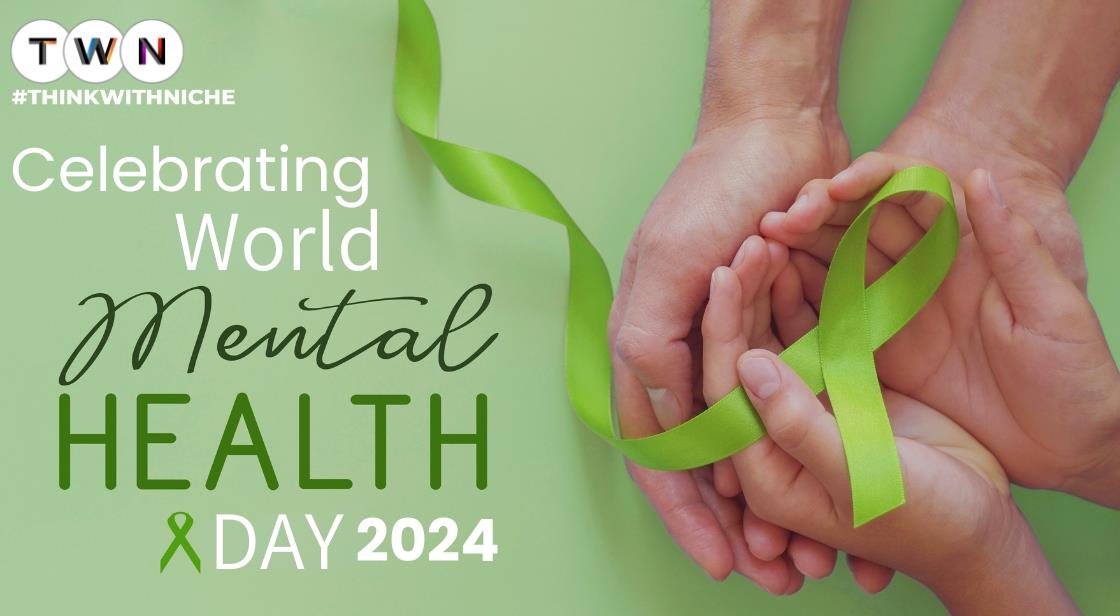Celebrating World Mental Health Day 2024

Blog Post
World Mental Health Day, observed every year on October 10th, is a global initiative aimed at raising awareness about mental health issues, reducing the stigma surrounding mental illness, and promoting mental well-being.
First established in 1992 by the World Federation for Mental Health, the day has become a platform for advocates, healthcare professionals, and individuals alike to come together and champion the importance of mental health as an integral part of overall health.
In 2024, the theme focuses on "Mental Health at Work," emphasizing the need to address mental health challenges in the workplace, where a significant portion of the global population spends much of their time.
This blog will explore the history and significance of World Mental Health Day, global mental health statistics, the importance of mental well-being, and ways individuals can get involved in this year’s observance.
Through inspiring personal stories, community outreach programs, and the provision of valuable resources, World Mental Health Day 2024 continues its mission of fostering a world where mental health is a priority for all.
World Mental Health Day Observance 2024
World Mental Health Day is observed annually on October 10th, aiming to raise awareness about mental health issues and promote mental well-being globally. Established by the World Federation for Mental Health in 1992, this day serves as a platform to advocate for mental health education, understanding, and support. The observance is significant as it provides an opportunity to address the stigma surrounding mental health, encourage open conversations, and emphasize the importance of mental well-being in individuals' overall health.
History and Significance of World Mental Health Day
The origins of World Mental Health Day date back to 1992 when the World Federation for Mental Health initiated the observance to highlight mental health as a vital component of public health. Over the years, the day has evolved into a global event, with participation from various organizations, governments, and communities aiming to improve mental health services and policies. The significance of this day lies in its ability to bring together individuals, families, and organizations to foster discussions about mental health, thus reducing stigma and promoting access to resources and support.
World Mental Health Day 2024: Theme
The theme for World Mental Health Day 2024, in collaboration with the World Health Organization (WHO) and its partners, is "Mental Health at Work." With nearly 60% of the global population involved in some form of employment, WHO highlights the pressing need to address mental health challenges in the workplace. This year's focus emphasizes the importance of creating healthier work environments by reducing mental health risks. WHO points out that unhealthy workplaces—marked by stigma, discrimination, harassment, and poor working conditions—can severely affect mental well-being, diminish quality of life, and lower overall productivity.
Importance of Mental Health
Mental health awareness is crucial for fostering a society where individuals can openly discuss their mental well-being without fear of judgment. Awareness campaigns play a vital role in educating the public about the importance of mental health, promoting early intervention, and encouraging individuals to seek help when needed. By reducing stigma and misconceptions surrounding mental health, we create a supportive environment where individuals feel empowered to prioritize their mental health as they would their physical health.
Global Statistics and Impact of Mental Health Issues
According to the World Health Organization (WHO), around 1 in 8 people globally experience mental health disorders. This statistic underscores the prevalence of mental health issues, which can affect anyone regardless of age, gender, or background. The impact of these disorders is profound, with mental health issues contributing to substantial disability and loss of productivity. For instance, depression and anxiety alone cost the global economy approximately $1 trillion annually in lost productivity. The burden extends beyond individuals, affecting families, communities, and healthcare systems, leading to increased healthcare costs and social challenges.
Stigma and the Need for Open Discussions
Despite the prevalence of mental health issues, stigma remains a significant barrier to seeking help. Many individuals face discrimination and judgment when they disclose their struggles with mental health. This stigma can lead to feelings of isolation, shame, and reluctance to access necessary support services. Open discussions about mental health are essential to dismantling these barriers. Encouraging conversations around mental well-being fosters understanding and empathy, allowing individuals to share their experiences and seek help without fear. By promoting mental health awareness and advocating for open dialogue, we can create a more inclusive society that values mental well-being as an integral part of overall health.
Also Read: Achieving Peace of Mind: Simple Steps to Follow
Activities and Events for 2024
Local Events
In various communities around the globe, local events will be organized to raise awareness about mental health. Workshops will focus on topics like stress management, mindfulness, and emotional resilience, providing participants with practical tools and strategies to improve their mental well-being. Seminars led by mental health professionals will address common issues, such as anxiety and depression, and will encourage open discussions to reduce stigma. Awareness campaigns in public spaces, such as parks and community centers, will also be held, featuring informative booths, interactive activities, and distribution of mental health resources and literature to engage the public.
Online Initiatives
Recognizing the importance of digital engagement, numerous online initiatives are planned for 2024. Webinars featuring mental health experts will cover various themes, such as coping strategies during stressful times, the significance of mental health in schools, and the role of community support systems. These sessions will allow participants to interact and ask questions, enhancing their understanding of mental health issues. Social media campaigns will encourage users to share their mental health stories, using dedicated hashtags to foster a sense of community and support. Influencers and mental health advocates will participate in live discussions, spreading awareness and encouraging open conversations.
Community Outreach Programs
Community outreach programs will focus on vulnerable populations, such as youth, elderly individuals, and marginalized groups. Mobile clinics and mental health screenings will be organized to provide free services and resources, ensuring everyone has access to mental health support. Collaborations with local schools and organizations will facilitate workshops aimed at educating students and families about mental health, helping to build supportive environments. These programs aim to connect individuals with local mental health services, promoting ongoing support and fostering a culture of care and understanding.
By participating in these activities, communities can come together to celebrate World Mental Health Day and prioritize mental well-being for all.
How to Get Involved in World Mental Health Day Activities
World Mental Health Day, observed on October 10 each year, offers a meaningful opportunity for individuals to engage in activities that promote mental well-being and raise awareness. Here are several ways to get involved:
Participate in Local Events
Many communities organize events such as workshops, seminars, and awareness campaigns. Check with local mental health organizations or community centers to find events you can attend. Participating in these events allows you to learn more about mental health and connect with others who share your interest.
Host Your Own Activity
Consider organizing an event in your community, such as a mental health discussion group, a mindfulness workshop, or a fundraising activity for a local mental health charity. Engaging others in conversation about mental health can help reduce stigma and encourage openness.
Utilize Social Media
Leverage social media platforms to spread awareness about mental health. Share informative articles, personal experiences, or graphics that highlight mental health issues and resources. Use relevant hashtags, such as #WorldMentalHealthDay, to increase visibility and engage a broader audience.
Volunteer or Donate
Support local mental health organizations by volunteering your time or making a donation. Many organizations rely on community support to continue their work in promoting mental health and providing resources to those in need.
By taking these steps, individuals can actively contribute to the celebration of World Mental Health Day and help foster a culture of understanding and support for mental well-being.
Resources for Mental Health Support
National and Local Organizations
-
National Alliance on Mental Illness (NAMI): Offers education, support groups, and resources for individuals and families affected by mental health issues. Their helpline provides free, confidential support.
-
Mental Health America (MHA): Focuses on prevention and early intervention, providing resources like screening tools and educational materials for mental wellness.
Crisis Hotlines
-
National Suicide Prevention Lifeline: Available 24/7 at 1-800-273-TALK (8255), providing free and confidential support for individuals in crisis.
-
Crisis Text Line: Text “HELLO” to 741741 to connect with a trained crisis counselor for immediate support via text message.
Online Resources
-
Substance Abuse and Mental Health Services Administration (SAMHSA): Offers a treatment locator and various mental health resources, including information on prevention and recovery.
-
BetterHelp: An online platform connecting users with licensed therapists for virtual counseling sessions.
Apps for Mental Wellness
-
Headspace: A mindfulness and meditation app that provides guided meditations to reduce stress and improve focus.
-
Calm: Offers sleep stories, guided meditations, and relaxation techniques to enhance mental wellness.
Community Support Groups
-
Meetup: Search for local mental health support groups or wellness communities to connect with others facing similar challenges.
By utilizing these resources, individuals can find the support they need for mental health challenges and enhance their overall well-being.
Personal Stories and Testimonials
Inspiring Individual Stories
Personal narratives can have a profound impact on mental health awareness. For example, Sarah, a 32-year-old teacher, shares how attending a mental health workshop helped her recognize her struggles with anxiety. "I thought I was alone in my feelings, but hearing others share their experiences made me realize I wasn’t," she recalls. This newfound awareness empowered her to seek professional help, leading to a significant improvement in her well-being.
Community Support and Impact
John, a veteran, recounts how joining a support group for mental health helped him cope with PTSD. "At first, I was hesitant to share my story. But when I did, I found a community that understood my pain. It was liberating," he shares. These testimonials highlight the importance of community in providing support and fostering connections.
Quotes from Mental Health Professionals
Mental health advocates emphasize the importance of sharing such stories. Dr. Emily Carter, a clinical psychologist, states, "When individuals share their journeys, it not only helps them heal but also inspires others to seek help." Her sentiment reflects the collective responsibility of raising awareness and breaking the stigma surrounding mental health issues.
Conclusion
World Mental Health Day 2024 serves as a powerful reminder of the importance of mental well-being in every aspect of our lives, particularly in the workplace. By highlighting this year’s theme, "Mental Health at Work," we can drive much-needed conversations about creating supportive, healthy environments where individuals feel empowered to prioritize their mental health. Through global awareness, community outreach, and the sharing of personal stories, we can continue to reduce the stigma associated with mental health issues and encourage more open dialogue.
As we reflect on the progress made in mental health advocacy, it's crucial that we continue fostering understanding and support for those facing mental health challenges. By participating in local events, online initiatives, and community outreach, we can all contribute to a culture that values mental health as much as physical health. Let this observance inspire lasting change, where everyone, regardless of their background or occupation, has access to the mental health support they need to thrive. Together, we can build a future where mental well-being is a global priority.
You May Like
EDITOR’S CHOICE












